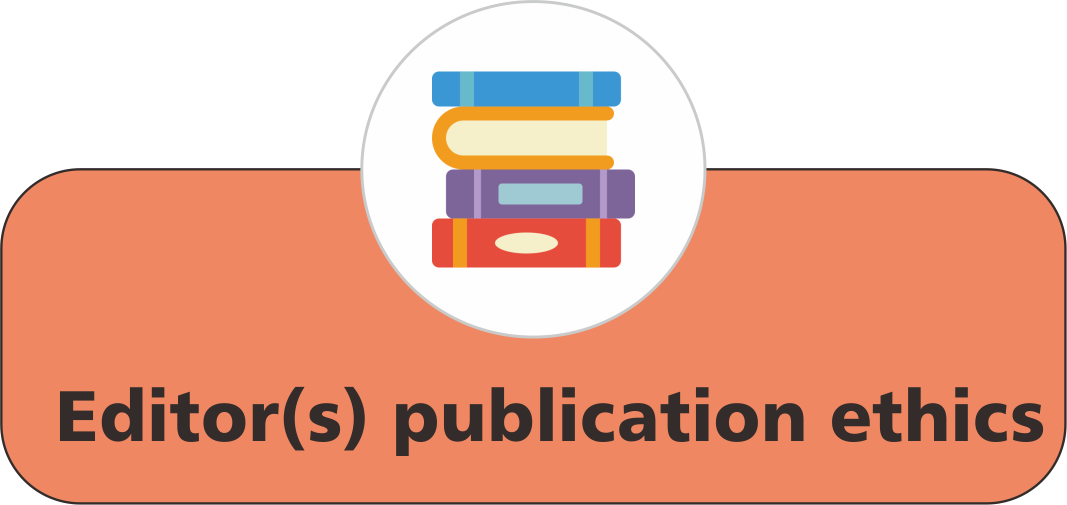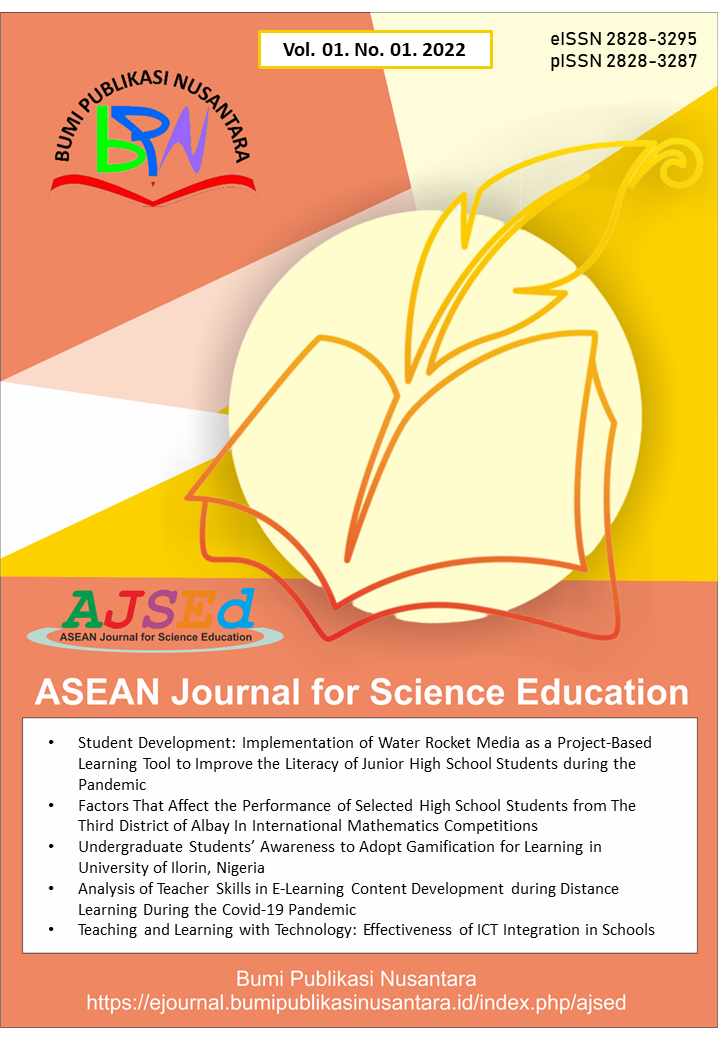Exploration of the Effect of Scaffolding Instructional Strategy on Pupils’ Academic Performance in Mathematics
 ), U. T. Saadu(2), O. Yahaya(3), T. O. Obafemi(4), F. M. Yakubu(5),
), U. T. Saadu(2), O. Yahaya(3), T. O. Obafemi(4), F. M. Yakubu(5),
(1) Kwara State University
(2) Kwara State University
(3) Kwara State University
(4) University of Ilorin
(5) University of Alabama
 Corresponding Author
Corresponding Author
Abstract
Keywords
References
Abubakar, R. B., and Eze, F. B. (2010). Female learners’ academic performance Mathematics at federal college of education (Technical), Omoku, Rivers State. International Journal of Social and Policy Issues, 11(2), 48-53.
Abubakar, R. B., and Uboh, V. (2010). Breaking the gender barrier in enrolment and academic achievement of science and mathematics learners. Akoka Journal of Pure and Applied Science Education AJOPASE, 10(1), 203-213.
Ajaja, R., and Mezieobi, S. A. (2018). Effect of cooperative learning strategy on students’ performance in social studies. International Journal of Education and Evaluation, 4(9), 96-103.
Akinoso, S.O. (2023). Motivation and ICT in secondary school mathematics using unified theory of acceptance and use of technology model. Indonesian Journal of Educational Research and Technology, 3(1), 79-90.
Albalawi, M. (2019). Does gender difference have an effect in the academic achievements of undergraduate learners’ and later as interns? A single medical college experience, Taibah University, KSA. Allied Journal of Medical Research, 3(1), 20-25.
Awodun, A. O., and Oyeniyi, A. (2018). Influence of school location `on learners‟ academic achievement in junior secondary school basic science in Ekiti State, Nigeria. Journal of Emerging Technologies and Innovative Research (JETIR), 5(6), 125-129.
Chen, J., and Wang, T. (2022). Effects of scaffolding on students' conceptual understanding and problem-solving skills in physics. International Journal of Science Education, 44(3), 377-397.
Hashim, S., Masek, A., Mahthir, B.N.S.M., Rashid, A.H.A., and Nincarean, D. (2021). Association of interest, attitude and learning habit in mathematics learning towards enhancing students’ achievement. Indonesian Journal of Science and Technology, 6(1), 113-122.
Husnah, A.U., Hidayat, M.A., and Jannah, M. (2021). The journey of a math: As a mathematics learning innovation. Indonesian Journal of Multidiciplinary Research, 1(1), 129-136.
Isa, S. G., Mammam, M. A., Badar, Y., and Bala, T. (2020). The impact of teaching methods on academic performance of secondary school learners in Nigeria. International Journal of Development Research, 10(7), 37382-37385
Jameel, H. T., and Ali, H. H. (2016). Causes of poor performance in mathematics from teachers, parents and learner’s perspective. American Scientific Research Journal for Engineering, Technology, and Sciences (ASRJETS), 15(1), 122-136.
Johnson, A., and Brown, C. (2018). The impact of scaffolding on academic achievement in Mathematics: A meta-analysis. Journal of Educational Psychology, 110(3), 378-394.
Johnson, J., and Jinks, J. (2021). Examining the effects of scaffolding on student engagement and learning in science inquiry. Journal of Research in Science Teaching, 58(2), 190-218.
Jones, B. (2020). The role of gender in the effectiveness of scaffolding strategies in Mathematics education. International Journal of STEM Education, 7(1), 1-15.
Lee, S., and Kim, J. (2017). Gender differences in the effectiveness of scaffolding interventions in mathematics classrooms. Educational Psychology, 37(7), 896-913.
Makondo, P. V., and Makondo, D. (2020). Causes of poor academic performance in mathematics at ordinary level: A case of Mavuzani high school, Zimbabwe. International Journal of Humanities and Social Science Invention (IJHSSI), 9(6), 10-18.
Marasabessy, R. (2021). Study of mathematical reasoning ability for mathematics learning in schools: A literature review. Indonesian Journal of Teaching in Science, 1(2), 79-90.
Maryati, W.E., Retnowati, E., and Thoe, N, K. (2022). Learning mathematics formulas by listening and reading worked examples. Indonesian Journal of Teaching in Science, 2(1), 61-74.
Obafemi, K. E. (2021). Effect of inside-outside circle instructional strategy on primary school pupils’ academic achievement in mathematics In Kwara State. Unilorin Journal of Lifelong Education (UJLLE), 5(1), 35-45.
Obafemi, K. E. (2022). Effect of differentiated instruction on the academic achievement of pupils in mathematics in Ilorin West Local Government Area, Kwara State. KWASU International Journal of Education (KIJE), 4(1), 51-59.
Obafemi, K. E., Fajonyomi, A. A., Ola-Alani, E. K. (2023). Effect of jigsaw IV Instructional strategy on pupils’ academic achievement in mathematics in Kwara State, Nigeria. International Journal of Academic Pedagogical Research (IJAPR), 7(1), 48-52.
Obafemi, K. E., Obafemi, T. O., and Yakubu, F. M. (2023). Effect of demonstration method on primary school pupils' academic achievement in physical and health education. ASEAN Journal of Physical Education and Sport Science, 2(2), 99-104.
Smith, A. (2019b). Exploring the efficacy of scaffolding approaches in mathematics education. Journal of Educational Psychology, 111(5), 826-845.
Smith, R. (2019a). Examining the impact of scaffolding strategies on mathematics achievement: A longitudinal study. Journal of Research in Mathematics Education, 50(2), 201-218.
Vandepol, J., Volman, M., and Beishuizen, J. (2010). Scaffolding in teacher–student interaction: A decade of research. Educational Psychology Review, 22(3), 271-296.
Wood, D., Bruner, J. S., and Ross, G. (1976). The role of tutoring in problem-solving. Journal of Child Psychology and Psychiatry, 17(2), 89-100.
Wu, J., and Liu, M. (2021). Scaffolding digital literacy in language learning: Effects on students' writing performance and motivation. Computers and Education, 174, 110-122.
Yang, L., and Looi, C. K. (2023). Examining the effects of scaffolding on students' collaborative problem-solving in computer science education. Computers and Education, 171, 103-116.
Article Metrics
Abstract View : 1754 times
: 1754 times Download : 975 times
Download : 975 times
Refbacks
- There are currently no refbacks.
Copyright (c) 2023 Bumi Publikasi Nusantara

This work is licensed under a Creative Commons Attribution-ShareAlike 4.0 International License.







